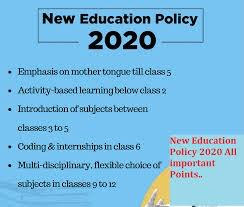 |
| Source:PoliceResults |
by Sanjay Ram
ABOUT
Education policy in India was not been changed in the past 28
years which means, there was no initiative or development that took place in the education
system in India from 1992. Almost Two generations had the same curriculum.
India a country where youth is majority but still, the same system of learning was
followed from our parent’s time! Most of the country has developed its system
of education according to their need, but now in 2020, our government has come
up with a new promising education policy.
NEW EDUCATION POLICY
The New Education Policy or NEP 2020 has come up with major
changes, The 10+2 system has been replaced with 5+3+3+4 in which preschool
from age 3-8 or foundational stage, 8-11 the preparatory, 11-14 is middle school
and 14-18 is secondary. The NEP provides a broader way of learning
as vocational subjects for students in 6th – 8th class
has been introduced, in which students have a workshop for 10 days. Course like coding
has been introduced in middle school. Subjects like Work Experience have been
promoted and, it can replace core subjects.
A major change has been seen in higher secondary where students
are divided into 3 groups (Science, Commerce, Humanities). Subjects were different for these 3 groups but now there can be a replacement or interlink in
the subjects. For example, A student who has taken Science can replace physics
with History or Civics and this is applicable to all 3 groups.
ADVANTAGES
This Education policy has many advantages, first of all, is the promotion of pre-school, which is not in government schools. Pre-school could
teach manners, good habits, and basic knowledge of subjects. In this new system, secondary schooling has been improved with the promotion of vocational
subjects. In higher secondary students can prefer their own subjects to study,
All three groups have been interlinked.
The most important thing is New Education Policy focuses more on
Knowledge than Marks. Exams would be conducted in such a way that students
have to think more practical rather than rot learning.
DISADVANTAGES
In New Education
Policy, learning in mother tongue or state’s language has been prompted for
students till primary, though it is not compulsory but, English has to be promoted
for students as it is useful for communication. Also, let’s take an example of a student who studies in a state till 5th, and then their family move to another state then learning would be difficult as the medium of teaching becomes a
barrier.
The interlink on subjects for higher education can create confusion on admission in college as all 3 major courses have been clubbed up.
CONCLUSION
This education policy has mostly positive things and could
cover up the Education System which was criticized for being rigid, focused only on marks and not on learning. This policy looks flexible and has
covered all the major points of learning and could prove the overall development
of a student.
But it should not be claimed as a revolutionary change as we
can clearly see, this policy has been taken from countries like USA, Germany and
Singapore as all changes are already present in these countries.
This Educational policy seems to be more theoretical rather
than practical, As we have to see how they imply this Education system.





Comments
Post a Comment